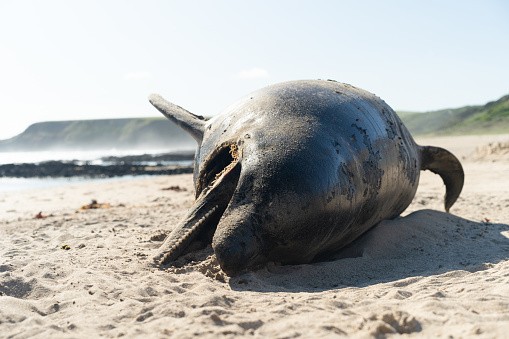In the largest study of dementia in toothed whales, researchers found that the brains of three species of stranded dolphins displayed classic markers of human Alzheimer's disease. This suggests that these animals may be prone to developing dementia, similar to humans.
The research team, which included scientists from the University of Glasgow, the Universities of St Andrews and Edinburgh, and the Moredun Research Institute, conducted a study on the brains of 22 stranded toothed whales found in Scottish coastal waters.
This was a pan-Scotland research collaboration aimed at understanding dementia in these animals. The researchers found that the brains of three species of dolphins displayed classic markers of human Alzheimer's disease, suggesting that these animals may be prone to developing dementia. The results of a study may explain instances of live stranding in certain species of toothed whales.
"Sick-Leader" Theory
The authors of the study suggest that the findings support the "sick-leader" theory, in which a pod of otherwise healthy animals becomes stranded in shallow waters because they are following a leader who may be disoriented or lost. Live stranding events, in which whales, dolphins, and porpoises become stuck in shallow water or on beaches, frequently occur in the United Kingdom. Some animals can be rescued and moved to deeper waters by experts, but others do not survive. The reasons for these events are not always understood, and further research is being conducted to learn more.
According to Neoscope, the researchers looked for brain abnormalities that are associated with Alzheimer's disease in stranded animals. These abnormalities included the presence of amyloid-beta plaques, the accumulation of phospho-tau, and gliosis (an increase in cell numbers due to damage to the central nervous system). The results showed that the brains of all the older animals studied had amyloid-beta plaques.
They found that three animals from different species of toothed whales had both amyloid-beta plaques and other brain abnormalities associated with dementia. This suggests that some species of toothed whales can develop neuropathology similar to Alzheimer's disease. However, it is not clear whether these animals would have experienced the same cognitive impairments as humans with clinical Alzheimer's disease.
The lead researcher, Dr. Mark Dagleish from the University of Glasgow, stated that these findings are significant because they demonstrate, for the first time, that the brain abnormalities found in stranded toothed whales are similar to those seen in the brains of humans with clinical Alzheimer's disease.

The carcass of a dead Bottle nosed dolphin, washed up on a beach in Victoria, Australia.
Alzheimer's Disease to Cetaceans
While the presence of brain abnormalities in toothed whales raises the possibility that they may also experience cognitive impairments similar to those seen in human Alzheimer's disease, it is important to conduct more research to better understand the situation. It is premature to draw firm conclusions at this stage.
Professor Frank Gunn-Moore from the University of St Andrews, a co-author of the study, commented that he has always been interested in finding out whether humans are the only ones who develop dementia. He stated that the findings of the study indicate that the potential for developing pathology associated with dementia is not exclusive to humans. Professor Gunn-Moore also emphasized the value of interdisciplinary collaboration between different research institutions and branches of the life sciences.
Professor Tara Spires-Jones from the University of Edinburgh stated that the team was intrigued to observe brain changes in older dolphins that resembled those seen in human aging and Alzheimer's disease. She noted that it is an important question for future research to determine whether these pathological changes contribute to the animals' stranding. The study involved the examination of animals that had already been stranded. The Scottish Marine Animal Stranding Scheme (SMASS), funded by Marine Scotland and Defra, performs post-mortem examinations of cetaceans (including toothed whales), seals, and marine turtles that strand and die in Scottish coastal waters.
RELATED ARTICLE: Dolphin Stabbed in the Eye and in Begging Position Dies From a Painful, Slow Death Due to Injury
Check out more news and information on Dolphins in Science Times.














